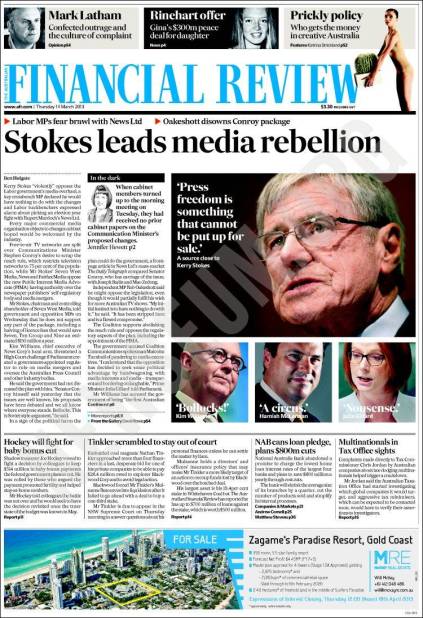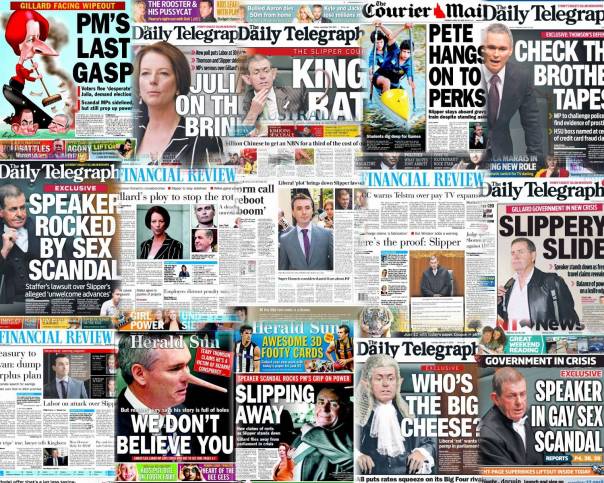Audio of Jon Faine – Stephen Conroy Interview
[audio http://blogs.abc.net.au/files/hectic-half-hour-8-3-13.mp3]
JON FAINE:
We shall turn or attention to state politics in a moment or two, but first on the federal sphere, is it true that there is now a push within the Labor Party to replace Julia Gillard and look for a Denis Napthine style option? Stephen Conroy is the Minister for Broadband Communications, the Digital Economy, Digital Productivity – this is the longest title anyone’s every had surely, and leader of the Government in the Senate. Senator Conroy good morning to you.
STEPHEN CONROY:
Yes it is a very long title. Good morning Jon.
JON FAINE:
We’ll come to the NBN and its problems in a moment, where you’re being accused of pork-barrelling, but is it true the Labor Party are looking at Simon Crean as a Denis Napthine option to replace Julia Gillard before the federal election?
STEPHEN CONROY: No.
JON FAINE:
My information is that that’s now being considered as an alternative to a Kevin Rudd push which would be electorally toxic.
STEPHEN CONROY:
Julia Gillard overwhelmingly won a vote last year for the leadership…
JON FAINE:
Long time ago now.
STEPHEN CONROY:
She retains the majority support of the Parliamentary Labor Party, and she will take us to the next election. There’s lots of stories but bottom line is, the Prime Minister has the overwhelming support of the caucus.
JON FAINE:
In the last 24 hours, since the change in leadership in Victora, it’s been put to me by figures involved in the Labor Party that this may be an option as well for resolving the predicament you find yourselves in. And Kevin Rudd, unacceptable, that would make a mockery of your procedures and processes, and Simon Crean emerges as the Denis Napthine.
STEPHEN CONROY:
Look Simon’s doing a great job travelling the country, talking about the benefits of Labor’s policies, explaining them to people in regional and rural Australia, championing the National Broadband Network, and is doing a fantastic job. But, Julia Gillard, the Prime Minister, has the overwhelming majority of caucus supporting her. And this is just further distraction to getting on with – explaining, demonstrating, and ensuring that our policies are fully understood out there in the broader community. I mean we are focused on reforming the education system, we’re focused on introducing a National Disability Insurance Scheme, and continuing the roll out of the National Broadband Network.
JON FAINE:
And yet the opinion polls show, and they’re trending in a very awkward direction, they show that none of that is getting through. And I put it to you again, Kevin Rudd, absolutely electorally unacceptable as well as internally toxic, Simon Crean the Napthine equivalent.
STEPHEN CONROY:
Look, Simon, as I said, is doing a great job. But Julia Gillard has the support of the overwhelming majority of the Parliamentary caucus. And what all of the caucus members need to focus on – is if we keep talking about ourselves, if we keep just having conversations about what’s going on in the Labor Party, we will get a response in the polls that goes down. People are not interested in hearing about the ins and outs in the Labor Party, they’re interested in hearing about how we’re going to reform the education system so that every child gets a better education; about how we’re going to ensure that one of the segments of society, families with disabled children and family members need more support; and the National Broadband Network which will open up opportunities for small business, open up opportunities…
JON FAINE:
Speaking of the Broadband Network, you’re accused of pork-barrelling with the roll out of the Broadband Network, and yet again we’re seeing western Sydney getting a disproportionate share of not just the NBN, but all infrastructure promises because of its electoral sensitivity.
STEPHEN CONROY:
Look this claim about the NBN and pork-barrelling Labor seats has been debated and disproved. But let me really precise about this, the ACCC, an independent statutory authority, intervened in the process of building the NBN. They said, following lobbying from telecommunications companies, that there will be what we call 121 points of interconnect, or POIs in the jargon. And they ticked the, you know, physical sites of these points of interconnect, and said you will start building from here. And if you overlay the map of the roll out of the NBN, it pretty much follows the instructions from the ACCC. And the ACCC are an independent statutory authority, so suggestions that there’s one electorate favoured over another are absurd.
I did want to raise one issue, John, which is starting to concern me, and I know a number of listeners, particularly to the ABC – there now seems to be a policy of trying to intimidate ABC personnel. Malcolm Turnbull is constantly attacking and trying to bully some of your journalists. And today I read in The Australian, and I know you shouldn’t always believe everything you read in The Australian, but a very disturbing thing where another journalist on the ABC staff has been internally disciplined because they’re not prepared to just accept every policy pronouncement, or claim that’s made publicly.
Now this cannot go on. These internal procedures of the ABC have to be more open and more transparent. Journalists cannot work on a basis that they’re going to be bullied and intimidated, and have complaints lodged against them in a process that is not transparent and open. This is the second…
JON FAINE:
Well now by way of background, the ABC has disciplined one of its editors, who – a man called Nick Ross who edits a forum on the ABC’s online publications, who has been critical of the Coalition. Mr Ross has been critical of the Coalition’s broadband policy, and supportive of yours. And it’s been determined by the ABC internal complaints process that his reporting has not been even-handed.
STEPHEN CONROY:
Well what – I don’t agree with all of Nick Ross’s findings, he’s not someone I’ve ever met expect for I think at press conference. I don’t agree with everything that Nick Ross writes in his columns. But what he’s been prepared to do is compare policies, now that is the job of journalists. To be prepared…
JON FAINE:
No, he’s been accused of being part of your fan club.
STEPHEN CONROY:
No he’s been prepared to compare the Labor Government’s NBN policy, and Malcolm Turnbull’s pretend NBN policy. And he’s gone to great lengths to compare all of the claims backwards and forwards, he’s been critical of me plenty of times in the past. In fact he used to be very critical to my face at press conferences. But what you see here is he’s engaged in getting the facts together, demonstrating that the claims – just by having the facts, demonstrating that the claims that Malcolm Turnbull makes about his policies, are not – don’t stand up to scrutiny. And for this he’s attacked by The Australian, he’s vilified in The Australian today, and a campaign, through a process that is non-transparent, doesn’t give people inside the ABC a fair go.
JON FAINE:
Well you’re the Minister for the ABC, if you think the process is not transparent and unfair, why don’t you do something about it?
STEPHEN CONROY:
Well I don’t run the ABC, it’s got a board, it’s got an independent charter, and it’s got a managing director. But I think it’s time to call out, where you’ve got journalists inside the ABC are being disciplined in a process that does not – does not remotely give fair justice to the journalists involved. This is just an outrageous process.
JON FAINE:
I have to return to state politics in a moment, but just one final question Senator Conroy, and we’ll see if either the ABC management or others want to comment on that, we’ll see if Mr Ross wants to comment too. But you’re a key factional warlord in Victoria for the right.
STEPHEN CONROY: [Laughs]
JON FAINE:
Who are you going to install in Gellibrand to replace Nicola Roxon?
STEPHEN CONROY:
Well I expect that the party will open its nominations in the near future. I’m sure, given it’s a very traditionally safe Labor seat, there’ll be a lot of interest, and there’ll be many nominations, and the rank and file members, as they do in most occasions in the Victorian branch of the Labor Party, get an opportunity to vote.
JON FAINE:
Yeah that’s the theory, but the practice is that you will choose who you want to install. Who have you got your eye on? Why not just tell us?
STEPHEN CONROY:
The rank and file members of the Labor Party will get nominations, and they will get an opportunity to vote on who they think will be the best representative for Gellibrand. We’ve been extraordinarily lucky in the last 20 years, we’ve had treasurers like Ralph Willis, we’ve had health ministers, and attorney-generals like Nicola Roxon. We have been very very lucky in Gellibrand to have some high quality candidates. I’m expecting a whole range of high quality people will put their hand up as well.
JON FAINE:
Are you going to offer a parachute to Senator David Feeney who’s been put into an unwinnable position on the Senate ticket in Victoria? One of those who was instrumental in the removal of Kevin Rudd.
STEPHEN CONROY:
Look, the third position in the Senate is not unwinnable, it’s challenging. David Feeney won it last time, and I’m confident David can win it again.
JON FAINE:
You’re going to leave him on the Senate ticket, or are you going to move him Gellibrand?
STEPHEN CONROY:
We’ll look for Gellibrand nomination to open, but I think David won against the odds the third Senate posi last time, and I’m confident David will be able to win from there again.
JON FAINE:
Thank you. we’ll read between the lines, and undoubtedly we’ll get the chance to speak again soon. Thank you for your time.
STEPHEN CONROY: Thanks Jon.
JON FAINE:
Senator Stephen Conroy, Victorian Labor Senator, and the Minister for the Broadband Communication, and Digital Economy portfolio in the Gillard Government.











